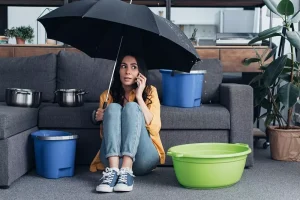While your landlord probably has insurance, his or her plan only covers the physical building you’re in. It doesn’t cover you or your belongings, which is why a renters insurance policy is always a wise investment.
Renters insurance shares some similarities with other home insurance policies, including how it protects you from water damage. Let’s take a look when and how it accomplishes this.
Does Renters Insurance Cover Water Damage?
Yes, your renters insurance will cover some instances of water damage in your home. Also, if you’ve caused water damage to another unit or someone is hurt because of water from your unit, your renters insurance could have you covered.
Renters insurance contains personal property and personal liability coverage and both of these coverages could protect you in different ways from water damage.
Water Damage to Your Apartment
The personal property portion of your policy is designed to safeguard your belongings from covered perils. One of these perils is accidental and sudden water damage. This can include a ceiling leak, some cases of toilet backup, and burst or frozen pipes. Some common suspects that cause covered water damage are broken washing machines, radiators and air conditioners.
For example, if you return from out of town and find that the TV and furniture in your living room were destroyed by a ceiling leak, you could file a claim and your renters insurance may reimburse you for these items.
Depending on which type of coverage you have, your renters insurance will reimburse you either for the actual cash value of what was lost or the replacement cost value of the items.
In short, replacement cost will pay you more for your stuff because it doesn’t factor in depreciation, but it’s the more expensive coverage. It’s important to keep a contents list so you know how much your belongings are worth and can get sufficient coverage to replace them if needed.
Another useful aspect of your renters insurance is loss of use coverage. If you have to move out of your home due to water damage, your loss of use coverage will reimburse you for expenses related to the time you have to spend in a hotel or another home of equivalent value.
You can also be reimbursed for food, storage, gas and more costs you wouldn’t have incurred if you wouldn’t have had to move out — thanks to your loss of use coverage.
Water Damage to Others
The personal property section of your policy protects you from the things mentioned above, but what if water coming from your unit has caused damage to someone else? In this case, your liability coverage in your renters insurance may apply.
Personal liability coverage financially protects you from some events caused by you or by your property. For example, if water originating from your unit leaks into the apartment under you and damages that person’s belongings, your renter’s insurance could cover you by paying for the items.
Also, if your water leak causes the person that lives under you to slip and fall and they sue you or need medical attention, your liability coverage may pick up their medical bills and your legal expenses.
Does Renters Insurance Cover Floods?
No, while it may come in handy in some cases, your renters insurance isn’t perfect when guarding you against water-related incidents. It won’t protect you from many instances of water damage you’ve caused and most types of flooding.
Flooding due to weather isn’t covered by your renters insurance, but we’ll get into this a little later on.
Water Damage That Your Renters Insurance Won’t Cover
Your policy won’t pay you for damage caused by personal negligence. For example, if your belongings were damaged after you left your sliding doors open while it was raining, or you forgot to turn the sink off and water got everywhere, your insurance isn’t responsible.
Also, if personal belongings in your bathroom are ruined by a flow of water from a toilet you left clogged for many days, your policy won’t reimburse you. This is because insurance is meant to cover you from perils out of your control, not perils you create.
It’s also important to remember that you’re not responsible for maintaining the building you’re living in as a renter; the landlord should take care of it. So you’re not responsible for most pipes, granted you didn’t break them yourself. This is why it’s important to notify your landlord as soon as possible if you see any problems.
Reporting old or rusted plumbing could avoid getting insurance involved altogether. Also, this is why your renters policy only reimburses you for your property. You don’t own the property, so you’re not responsible for repairs.
Additionally, if you happen to be subleasing your rented home to another person, that person isn’t covered for water damage under your policy while you’re not living there.
Flood Insurance for Renters
As mentioned earlier, your renter’s insurance won’t cover floods. A separate flood insurance policy is needed. Your insurance company may offer flood insurance through the National Flood Insurance Program, or you could go to the NFIP directly to find a way to be covered.
The cost of a renters flood policy depends on several factors, like the age and size of your building, your deductible and how prone your area is to flooding.
Even if your landlord has flood insurance, this doesn’t mean you’re covered against flood damage. As mentioned previously, your landlord’s policy only covers the physical structure of the building. To insure your belongings, you would need to get a flood insurance policy.

Stay Above Water With Flood Insurance
Do you want to pay for costly and common flood damage yourself or have an insurance policy pick up the tab?
Will a Water Damage Claim Increase My Renters Insurance?
A renters insurance claim may raise your rates, although to what extent varies by insurer. A general rule of thumb is the more claims you file, no matter what type, the higher your premiums will be. For renters, several claims in a short amount of time could result in cancellation or nonrenewal of your policy.
Insurers increase rates after claims because someone who filed a claim is more likely to file another one, as opposed to someone who’s never used their insurance. The company has to charge you more to offset the increased financial risk it’s taking on.
If the damage caused by water is less than or close to your deductible amount, it would be wise to not file a claim. You wouldn’t receive enough to replace what was broken and it could cause your premiums to rise, so it would be more cost-effective to pay for it out of pocket.
For example, if you have a $500 deductible and a pipe under your sink sprung a leak and ruined your $600 laptop on the kitchen counter, you might not want to file a renters claim to replace it.
After paying your deductible, you’d only receive $100 from your insurer, which isn’t enough to cover your laptop on its own. Also, this could raise your rate, which over a period of months or years could add up to more than the $100 you initially received.
Instead, you may just want to bite the bullet and save up for another laptop without getting insurance involved. This could be a cheaper and quicker solution in some cases.
The editorial content on Clovered’s website is meant to be informational material and should not be considered legal advice.

